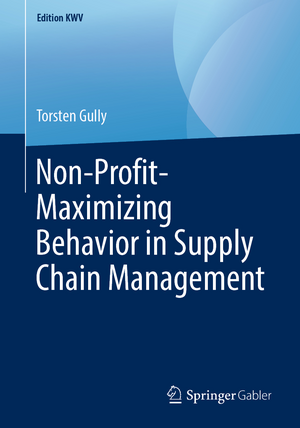Non-Profit-Maximizing Behavior in Supply Chain Management: Edition KWV
Autor Torsten Gullyen Limba Engleză Paperback – 19 feb 2019
Non-profit-maximizing behavior in supply chain management focuses on the human component in supply chain management. It develops behavioral models that consider individual and social preferences of supply chain members in order to improve our understanding of actual decision-making in supply chain management.
The author challenges the common assumption of a selfish homo economicus and introduces the human component in three experimental studies: In the first study, he examines the effect of individual risk preferences in the Newsvendor context. In the second study, a common group identity to overcome incentive conflicts in forecast sharing is studied. The third study explores underlying cognitive processes in contractual decision-making.
Potential readership includes scholars and graduate students who are interested in the field of behavioral operations management and practitioners looking for behavioral aspects of decision makingin supply chain management.
Din seria Edition KWV
-
 Preț: 325.05 lei
Preț: 325.05 lei -
 Preț: 192.87 lei
Preț: 192.87 lei -
 Preț: 217.89 lei
Preț: 217.89 lei -
 Preț: 457.80 lei
Preț: 457.80 lei -
 Preț: 364.56 lei
Preț: 364.56 lei -
 Preț: 317.68 lei
Preț: 317.68 lei -
 Preț: 322.49 lei
Preț: 322.49 lei -
 Preț: 461.50 lei
Preț: 461.50 lei -
 Preț: 390.63 lei
Preț: 390.63 lei -
 Preț: 279.06 lei
Preț: 279.06 lei -
 Preț: 291.74 lei
Preț: 291.74 lei -
 Preț: 298.65 lei
Preț: 298.65 lei -
 Preț: 318.44 lei
Preț: 318.44 lei -
 Preț: 461.50 lei
Preț: 461.50 lei -
 Preț: 213.20 lei
Preț: 213.20 lei -
 Preț: 459.00 lei
Preț: 459.00 lei -
 Preț: 214.74 lei
Preț: 214.74 lei -
 Preț: 454.92 lei
Preț: 454.92 lei -
 Preț: 277.48 lei
Preț: 277.48 lei -
 Preț: 218.42 lei
Preț: 218.42 lei -
 Preț: 349.74 lei
Preț: 349.74 lei -
 Preț: 248.75 lei
Preț: 248.75 lei -
 Preț: 382.36 lei
Preț: 382.36 lei -
 Preț: 264.79 lei
Preț: 264.79 lei -
 Preț: 393.13 lei
Preț: 393.13 lei -
 Preț: 232.74 lei
Preț: 232.74 lei -
 Preț: 140.26 lei
Preț: 140.26 lei -
 Preț: 319.43 lei
Preț: 319.43 lei -
 Preț: 501.99 lei
Preț: 501.99 lei -
 Preț: 294.04 lei
Preț: 294.04 lei -
 Preț: 350.30 lei
Preț: 350.30 lei -
 Preț: 388.72 lei
Preț: 388.72 lei -
 Preț: 271.16 lei
Preț: 271.16 lei -
 Preț: 138.74 lei
Preț: 138.74 lei -
 Preț: 285.38 lei
Preț: 285.38 lei -
 Preț: 349.74 lei
Preț: 349.74 lei -
 Preț: 380.84 lei
Preț: 380.84 lei -
 Preț: 425.96 lei
Preț: 425.96 lei -
 Preț: 460.69 lei
Preț: 460.69 lei -
 Preț: 392.21 lei
Preț: 392.21 lei -
 Preț: 381.98 lei
Preț: 381.98 lei -
 Preț: 279.98 lei
Preț: 279.98 lei -
 Preț: 221.48 lei
Preț: 221.48 lei -
 Preț: 292.72 lei
Preț: 292.72 lei -
 Preț: 273.83 lei
Preț: 273.83 lei -
 Preț: 432.71 lei
Preț: 432.71 lei -
 Preț: 354.17 lei
Preț: 354.17 lei -
 Preț: 238.35 lei
Preț: 238.35 lei -
 Preț: 275.45 lei
Preț: 275.45 lei -
 Preț: 288.87 lei
Preț: 288.87 lei
Preț: 317.30 lei
Nou
Puncte Express: 476
Preț estimativ în valută:
60.72€ • 63.55$ • 50.53£
60.72€ • 63.55$ • 50.53£
Carte tipărită la comandă
Livrare economică 31 martie-14 aprilie
Preluare comenzi: 021 569.72.76
Specificații
ISBN-13: 9783658240875
ISBN-10: 3658240873
Pagini: 171
Ilustrații: XVII, 171 p. 47 illus.
Dimensiuni: 168 x 240 mm
Greutate: 0.31 kg
Ediția:1st ed. 2013, reprint 2019
Editura: Springer Fachmedien Wiesbaden
Colecția Springer Gabler
Seria Edition KWV
Locul publicării:Wiesbaden, Germany
ISBN-10: 3658240873
Pagini: 171
Ilustrații: XVII, 171 p. 47 illus.
Dimensiuni: 168 x 240 mm
Greutate: 0.31 kg
Ediția:1st ed. 2013, reprint 2019
Editura: Springer Fachmedien Wiesbaden
Colecția Springer Gabler
Seria Edition KWV
Locul publicării:Wiesbaden, Germany
Cuprins
1. Introduction.- 2. Risk Preferences of Informed Newsvendors.- 3. Group Preferences and Forecast Sharing in Supply Chains.- 4. Fairness Preferences and Priming in Contracting.- 5. Conclusion.- Bibliography.
Notă biografică
Torsten Gully published his work with Kölner Wissenschaftsverlag until 2018.
Textul de pe ultima copertă
Non-profit-maximizing behavior in supply chain management focuses on the human component in supply chain management. It develops behavioral models that consider individual and social preferences of supply chain members in order to improve our understanding of actual decision-making in supply chain management.
The author challenges the common assumption of a selfish homo economicus and introduces the human component in three experimental studies: In the first study, he examines the effect of individual risk preferences in the Newsvendor context. In the second study, a common group identity to overcome incentive conflicts in forecast sharing is studied. The third study explores underlying cognitive processes in contractual decision-making.
Potential readership includes scholars and graduate students who are interested in the field of behavioral operations management and practitioners looking for behavioral aspects of decision makingin supply chain management.
Caracteristici
Gives an insight into Non-Profit-Maximizing Behavior in Supply Chain Management Challenges the common assumption of a selfish homo economicus via three studies The book is aimed at scholars and graduate students of business economics
